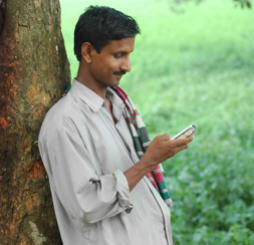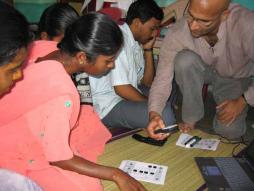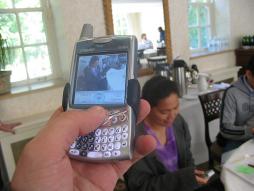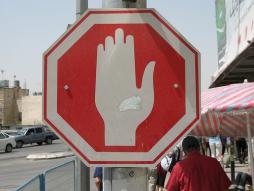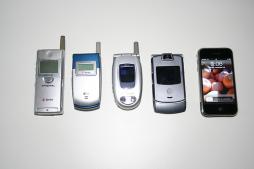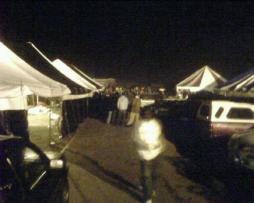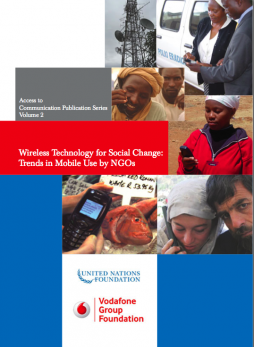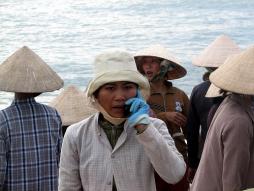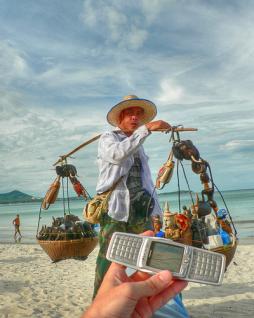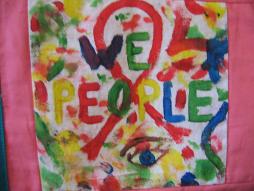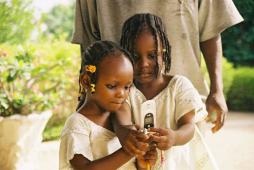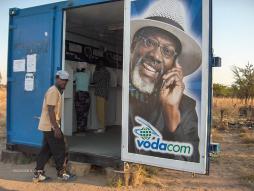mobile phones
Posted by KatrinVerclas on Sep 10, 2008
One India reports on how mobile phones are used after the devastating floods in Bihar, India. While relief and aid have been very slow to get to Bihar, mobiles are proving to be a life saver. According to One India,
[Mobiles] are playing the most crucial role in largescale evacuation and rescue of marooned people from far flung areas. The availability of mobile phones to all sections of people across the flooded regions and their 24 hour connectivity during the crisis period, greatly helped the rescue teams to locate the cut off villages and localities besides saving many lives even from remote areas.
Through cell phones the marnooed people were also able to remain connected with the district officials to guide them about their need and the urgency of rescuing them.
In absence of any other mode of communication, particularly the land line telephones, as most of which went under six to eight feet of water in the worst affected districts of Madhepura, Supoul, Araria and Sitamarhi, it was the connectivity of mobile phone network that had kept the hopes of lakhs of people alive.
Posted by Esther Nasikye on Aug 24, 2008
Agriculture is what keeps economies in most developing countries alive. However, farmers in many countries face major challenges. In an age of global markets, they are forced to enhance production, improve the quality of their yield, and access markets within short timeframes. Small-scale farmers especially have traditionally been deprived of weather and crop information, have been at the mercy of middlemen, and have lacked timely market price information to negotiate the best deal. This has chancged with the a connect people advent of widespread telephony that connects farmers wiith markets, weather, and other data.
Governments, non-governmental organisations (NGOs) and international donors are taking advantage of this technology revolution to help farmers access market information. They are convinced that low-cost access to agricultural prices could yield enormous payoffs.
In Uganda, the Women of Uganda Network (WOUGNET), a local NGO, is helping over 400 rural farmers in the Apac District in Northern Uganda, access information on market prices through text messages (SMS).
Posted by KatrinVerclas on Jul 04, 2008
SANGONeT and MobileActive.org invite you to register now for MobileActive08. MobileActive08 is the only global gathering that is connecting leaders who are working at the convergence of civil society, mobile technology and social change. If you:
- have expertise in the field of mobile technology for social development,
- are a researcher working on mobile technology for social impact, or
- are a mobile service provider with interest in the social market,
MobileActive08 is for you. Register now!
MobileActive08 is the largest event to date focused on mobile technology for social development. This global gathering brings together people like you - practitioners, researchers, technologists and donors experienced and interested in the use and application of mobile technology for social impact. Register now!
At MobileActive08 you will explore how mobile phones are effectively used to advance civil society work, assess the current state of knowledge in the use of mobile technology to advance social development, and investigate trends, needs and investment opportunities.
We will cap attendance at 350 people and we expect to fill up quickly, so please register now to ensure your participation. Our partners at SANGONet and we at MobileActive.og look forward to welcoming you to South Africa!
Posted by KatrinVerclas on Jun 30, 2008
Mobile social marketing works in increasing awareness and moving people to actions. It is also becoming an effective way to engage users and constituents. Throughout our experience with mobile campaigns, we've run into the some great campaigns and some failures as well. In our ongoing series of articles and case studies on using mobiles for advocating for an issue and engaging a constituency, here are our top ten things that nonprofits should and shouldn't do when running a mobile advocacy campaign.
The DOs of Mobile Advocacy
Posted by CorinneRamey on Jun 27, 2008
Note: This primer was written for the NTEN newsletter, targeted at a US audience and thus focuses on America. For more on mobile advocacy in many other parts of the world, see here.
Posted by CorinneRamey on Jun 05, 2008
A new report, Perceived economic benefits of telecom access at the Bottom of the Pyramid in emerging Asia, takes a new look at the effect of mobile phones on the lives of people at the so-called 'bottom of the pyramid.' The report, published by LIRNEasia, states that although anecdotal evidence shows that mobile phones are economically beneficial to base-of-the-pyramid users, there is little empirical evidence to reinforce this claim. The authors conducted a study on mobile phone usage in five Asian countries and used the results to analyze the benefits -- economic and otherwise -- of mobiles on users at the bottom of the pyramid.
There is a plethora of small studies and anecdotal evidence that show the economic impact of mobile phones on small groups or communities of users, such as studies of fisherman in Porto da Manga, Brazil, and Moree, Ghana.
Posted by KatrinVerclas on May 26, 2008
I am in South Africa this week as violence against immigrants broke out in townships all over the country. There are several initiatives that have now been launched to combat the violence -- using mobile phones.
In response to the violence against foreigners, the Western Cape Emergency Task Team with the leadership of Peter Benjamin of Cell-Life, has activated a national SMS emergency system for citizens to respond to the violence. The Task Team, a coalition of South Africa's Treatment Action Campaign (TAC) and over 20 NGOs, has activated “NO TO XENOPHOBIA” SMS lines across South Africa.
Posted by KatrinVerclas on May 20, 2008
Danny Quah is Head of Department and Professor of Economics at the London School of Economics. I had the pleasure of meeting Danny at the recent release of "Wireless for Social Change: Trends in NGO Mobile Use," in London. This report is an exploration of how mobile technology is changing the way NGOs do their work, and includes case studies of how mobiles are used in social development. Danny had an articulate and cogent critique of our findings. We thought it would be interesting to MobileActive readers to hear his thoughts -- with which I could not agree more -- re-published here with permission.
Posted by KatrinVerclas on Apr 29, 2008
Mobile technology is transforming the way advocacy, development and relief organizations accomplish their institutional missions. This is nothing new to readers of MobileActive. Our recent report Wireless Technology for Social Change: Trends in NGO Mobile Use, released today by the United Nations Foundation and The Vodafone Group Foundation, brings this point home.
Wireless Technology for Social Change: Trends in NGO Mobile Use was written by Sheila Kinkade (ShareIdeas.org) and Katrin Verclas (MobileActive.org), and commissioned by the United Nations Foundation-Vodafone Group Foundation Technology Partnership. The report examines emerging trends in “mobile activism” by looking at 11 case studies of groups active in the areas of public health, humanitarian assistance and environmental conservation.
Posted by CorinneRamey on Feb 26, 2008
MobileActive has aggregated dozens of videos focused on the use of mobile phones in civil society on our new MobileActive YouTube channel.
The MobileActive channel features playlists about mobile phones used in a variety of different fields. On the Mobile Phones in Advocacy playlist, you can watch videos about Greenpeace Argentina's work to pass the Ley de Bosques (Forest Law) by using mobile phones and an advertisement for FishMS, a South African SMS infoline that allows users to text in the names of fish and get a rating about their environmental sustainability. Watch the Mobile Phones in Global Development channel for videos on mobile banking, the Village Phone program, and the growth of mobile phones in the developing world. Check out the Mobile Phones in Human Rights playlist for a variety of videos of human rights abuses taken on mobile phones, including the mobile videos of Egyptian police brutality by blogger Wael Abbas.
Other MobileActive YouTube playlists include Mobile Phones in Citizen Media, Mobile Phones in Disasters and Relief, Mobile Phones in Education and Learning, Mobile Phones in Elections and Participation, Mobile Phones in Poverty Alleviation, and many others.
Check out the new MobileActive YouTube channel and add your videos on the mobile revolution!
Posted by KatrinVerclas on Feb 07, 2008
Mobile phones help to decrease the gap between rich and poor nations, and spur economic development, says a UN Report.
In its annual Information Economy Report, UNCTAD, the UN Conference on Trade and Development says that mobile phone subscribers have tripled in developing countries over the last five years, and now make up 58 percent of mobile subscribers worldwide.
"In Africa, where the increase in terms of the number of mobile phone subscribers and penetration has been greatest, this technology can improve the economic life of the population as a whole," the report said.
But while UNCTAD said the revolution in information and communication technology was spreading to the developing world, more had to be done to make sure poorer countries benefited from the opportunities in growth and development.
Africa has seen the greatest rise in mobile use subscriptions have quadrupled since 2001, and last year they hit 200 million - an average of more than 20 cell phones for every 100 people.
Posted by KatrinVerclas on Jan 29, 2008
We are occasionally commissioned to write introductory articles about the mobile revolution and implications for NGOs for various publications. Here is one broad overview of some areas where mobiles are deployed in civil society.
Cellphones have become the most ubiquitous communication device in the hands of human beings. There are an estimated 3.5 billion mobile phones in use and there is coverage in even remote corners of the world. Cellphones have revolutionized not just the way we work and organize within cultures and societies, but have the potential to change how NGOs (non-governmental organizatios) operate.
Mobile phones are already experimentally used in multiple ways by NGOs. We at MobileActive.org have been tracking how organizations in areas such as health and disease prevention, economic development, humanitarian relief, democratic participation, and advocacy are using mobile phones to make their work more effective and efficient.
Following are a few examples of what we have seen and where we think mobile phones have potential to be used more strategically by NGOs.
Posted by KatrinVerclas on Jan 03, 2008
We are very pleased to announce the first set of translations of MobileActive's Strategy Guides into Arabic. Thank you to the National Democratic Institute for its pro-bono support for the translation.
Mobile phones have become a powerful emerging tool for participation in civil society. The MobileActive series of Strategy Guides, now in Arabic, examines the effectiveness of civil society organizations using mobile phones to build their constituent lists, influence political causes, and raise money. In the Guides we aggregate strategies, case studies, and lessons learned to encourage the adoption of mobile phones by nonprofits.
This series of Strategy Guides is designed to equip organizations around the world with the know-how to deploy effective mobile campaigns for a variety of types of activism and advocacy.
Posted by Christine on Nov 29, 2007
I wanted to share this article that I saw as a bit of a milestone. According to a report from Informa Telecoms & Media, worldwide mobile penetration has hit 50% today.
Informa estimates that mobile networks covered 90 per cent of the global population by mid-2007. This means that some 40 per cent of the world's inhabitants are covered by a network, but not connected, and leaves just 10 per cent with neither coverage nor connection.
Posted by KatrinVerclas on Oct 20, 2007
HIV/AIDS is one of the most significant human, health, and development issues facing Africa today. NGOs and health care providers are increasingly turning to mobile phones to address the unique challenges of AIDS awareness, prevention and treatment. "HIV/AIDS is arguably the most pressing development problem facing South Africa – and Africa," asserts a report by the United Nations Children's Fund (UNICEF ) and Women'sNet, a South African network of people who use ICTs in gender-related advocacy and support. The report, titled "Rapid Assessment of Cell Phones for Development," is available here on the UNICEF website.
Posted by CorinneRamey on Sep 28, 2007
The rural mobile market is growing, and carriers are working to meet the unique demands and challenges of this sector of the population. Even in the poorest countries -- like Sierra Leone, which ranks 176 out of 177 countries on the UN's 2006 Human Development Index -- mobile phones have become a growing necessity, creating a unique set of cultural norms and practices. According to a recent article in Africa News, "It is no secret that Sierra Leone has one of the largest mobile network services although said to be the least developed country in the West African Sub-Region." Mobile service in Sierra Leone is covered by three carriers -- Mobitel, Celtel and Millicom. Although the network has increased dramatically since the civil war ended in 2000, there is still demand from rural customers for more comprehensive coverage in poor rural areas.
Posted by KatrinVerclas on Sep 18, 2007
We are starting a series of articles on mobile phones in economic development this week and to kick it off, Business Week in its current issue published a few interesting summaries of the state of affairs in mobiles in economic development. This apparently just to make it easy for us to get MobileActives around the world up to speed!
Upwardly Mobile in Africa describes farmers in Kenya using mobiles to bring their products to market and mobile payments using the Keyan mobile payment system M-Pesa. The article describes Grameen Foundation's Village Phone Program that we will be featuring in our next article that is expanding into Uganda in collaboration with the local carrier MTN where there are now 13,000 Village Phone Operators renting out a mobile phone with the help of microcredit and discounted airtime.
Posted by bartlacroix on Aug 16, 2007
Mobile phones change the media landscape in Africa. AfricaNews (www.africanews.com) starts working with mobile phone reporters. The mobile reporters cover current events in their area, using the mobile phones to produce video footage, written reports and photographs. With this innovative project, African citizens – from the sprawling metropolises to the most isolated villages – can let their voices be heard across the continent and around the world.
Africa is witnessing impressive growth in the development and use of mobile communication networks and the Internet. This development is changing the face of media and the way people are informed. Open communication and uncensored exchange of opinions are helping to build transparent societies. This serves good governance and helps to build stronger democracies.
Posted by John.L.German on Aug 11, 2007
Of the hundreds of mainstream-media news stories around the world on Wednesday August 8, 2007, about the pro-Tibet protest in China this week, the one copied below focused on the role of information and communication technologies in a compelling, vivid, and memorable way.
I hope that readers will know where this story could be taken and how it could be highlighted and used to maximum effect as an example of outstanding innovative use of free new-media tools to achieve social change -- feel free to do that, or let me know what should be done.
Posted by KatrinVerclas on Aug 08, 2007
Mobile phones are a vital resource in the fight against human trafficking. We hear occasionally of stories like this recent one from Kuala Lumpur, Malaysia. Malaysian police tracked down a syndicate using foreign women as sex slaves after receiving text messages from the women allegedly being held against their will.
According to the Star, "groups of gangsters in the eastern Sarawak state on Borneo island are believed to be holding women from the Philippines, Indonesia and China as prostitutes for foreign labourers working at the massive Bakun hydroelectric dam construction site in the state." One of the women obtained the mobile number of a reporter from the English daily and began sending SMS messages that the Star reported to police. A police raid resulted in the arrest of a local pimp and 10 women from Indonesia, the Philippines and China.
Meanwhile, in the Ukraine, three of the country's carriers are collaborating with the International Organization for Migration and set up a toll-free trafficking hotline. According to a report on Radio Netherlands, "customers of Ukrainian mobile phone service providers KyivStar, MTS and life:) can dial '527' from their handsets in order to receive information and advice from the IOM on migration and trafficking issues." The short code routes calls to a free IOM service providing information on the current realities facing migrants abroad including human trafficking and the consequences of irregular entry and stay in foreign countries. Migrants can also request information on legal methods of migration.
Posted by KatrinVerclas on Jul 23, 2007
Technology that has been taken for granted by people in wealthy countries is making life easier and safer for many poor in developing countries.
The rapid spread of cellular telephones in many African countries has been a remarkable and unexpected phenomenon particularly when one considers the high levels of poverty and social turmoil that occurs in many of these countries. Last year the Enterprise Africa! team visited Botswana in order to document the poverty alleviating aspects of the cellular telephone. Technology that has long been taken for granted by people in wealthy countries is making life easier, safer, and more prosperous for many, including the poor in developing countries. A result of the rapid diffusion of this technology is the creation of a vast number of jobs and enterprises, enabling many Africans to escape the poverty trap.
The most obvious benefit of cellular telephones is that they provide access to communication where none existed before. Families in remote areas, and farmers and businesses that could not afford or even obtain fixed lines, are now able to talk with loved ones, receive orders, schedule deliveries, and make appointments. Mobile phones were an immediate success, even in areas that already had access to landlines, because in addition to connectivity they offered services like itemised billing, prepaid or contract options, and other value-added services.
Posted by KatrinVerclas on Jul 22, 2007
Sexual education is entering the mobile age. In Singapore, famous "Dr Love" offer answers to sex-related questions to the predominatly Muslim population via mobile phone. Half-way around the world, SexInfo doles out sexual health info to teens in 160 characters on the Unites States West Coast, and similar services operate in London and in Australia.
In Singapore, according to the Age:
Indonesians are invited to send a text message with any sex-related question to a panel of volunteer local doctors who will either send them a message back or use their question to help compile information on a website.
The brains behind the idea, Wei Siang Yu, who is nicknamed "Dr. Love" for his flamboyant methods of teaching Singaporeans about sex, told a press briefing his scheme would turn conventional sex education on its head.
Posted by KatrinVerclas on May 09, 2007
Ethan Zuckerman has written a solid overview of mobile phones in international activism. It is re-posted here under its Creative Commons license. For additional resources, see also the mobileactive.org Strategy Guides on using mobile phones in elections, advoacy, and fundraising.
